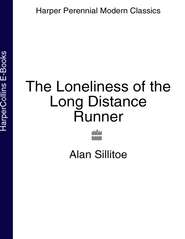По всем вопросам обращайтесь на: info@litportal.ru
(©) 2003-2025.
✖
Saturday Night and Sunday Morning
Настройки чтения
Размер шрифта
Высота строк
Поля
Arthur wondered. Has he? Was it possible? His face looked thoughtful. What was it? No one could have told Jack about his carrying-ons. Or could they, the nosy gossiping spies? Not much they couldn’t. He does seem a bit funny this morning.
‘What about, Jack?’ he asked, screwing the top back on his flask.
‘Nothing much. Only Robboe came up to me the other day and told me that I was to start on nights next week in the Press Shop. They’re short-handed there and want another tool-setter. A week on nights and a week on days.’
‘That’s a bastard,’ Arthur commiserated, thinking he was saying the right thing under the circumstances. ‘I’m sorry, Jack.’
Then he saw his mistake. Jack was really happy at his transfer. ‘I don’t know about that. It’ll mean a bit more money. Brenda’s been on about a television set lately, and I might be able to get her one like that.’
He accepted a cigarette from Arthur, who said: ‘All the same, who am I going to talk to in tea-break?’
Jack laughed, a curious laugh, since the frown managed somehow to stay on his face. ‘You’ll be all right,’ and slapped him — not very hard — on the shoulder, saying:
‘I’ll see you again.’
The light flashed: tea-break over.
I’m just too lucky for this world, Arthur told himself as he set his lathe going, too lucky by half, so I’d better enjoy it while I can. I don’t suppose Jack’s told Brenda yet about going on nights, but I’ll bet she’ll die laughing at the good news when he does. I might not see her at weekends, but I’ll get there every night, which is even better. Turn to chamfer, then to drill, then blade-chamfer. Done. Take out and fix in a new piece, checking now and again for size because I’d hate to do a thousand and get them slung back at me by the viewers. Forty-five bob don’t grow on trees. Turn to chamfer and drill, then blade-chamfer, swing the turret until my arms are heavy and dead. Quick as lightning. Take out and fix in, shout for the trolley to take it away and bring more on, jotting down another hundred, not noticing the sud smells any more or belts over my head that gave me the screaming abdabs when I first came in the factory at fifteen, slapping and twisting and thumping and changing direction like Robboe the foreman’s mind. It’s a hard life if you don’t weaken, so you grab like owt to earn a few quid, to take Brenda boozing and back to bed, or to the footpaths and woods up Strelley, passing the big council estate where Margaret my sister has a house and three kids from her useless husband, taking Brenda by all that to a broken-down shepherd’s cottage that I’ve known since I was a kid and laying her on the straw and both of us so loving to each other that we can hardly wait. Only less of this or there’ll be another handle on the lathe that I won’t know what to do with and another gallon of suds that will jam the works. Time flies and no mistake, and it’s about time it did because I’ve done another two hundred and I’m ready to go home and get some snap and read the Daily Mirror or look at what’s left of the bathing tarts in the Weekend Mail. But Brenda, I can’t wait to get at her. It serves you right, ducks, for being so lush and loving. And now this chamfer-blade wants sharpening, so I’ll give it to Jack this afternoon. And it’s too bad about him, but he’ll be going on nights soon which is too bad as well, for him, because Brenda and me’ll play merry hell in all the beds and nooks we can find. Bloomers flying, and legs waving in Strelley Woods, no matter how cold it gets.
The minute you stepped out of the factory gates you thought no more about your work. But the funniest thing was that neither did you think about work when you were standing at your machine. You began the day by cutting and drilling steel cylinders with care, but gradually your actions became automatic and you forgot all about the machine and the quick working of your arms and hands and the fact that you were cutting and boring and rough-threading to within limits of only five-thousandths of an inch. The noise of motor-trolleys passing up and down the gangway and the excruciating din of flying and flapping belts slipping out of your consciousness after perhaps half an hour, without affecting the quality of the work you were turning out, and you forgot your past conflicts with the gaffer and turned to thinking of pleasant events that had at some time happened to you, or things that you hoped would happen to you in the future. If your machine was working well — the motor smooth, stops tight, jigs good — and you spring your actions into a favourable rhythm you became happy. You went off into pipe-dreams for the rest of the day. And in the evening, when admittedly you would be feeling as though your arms and legs had been stretched to breaking point on a torture-rack, you stepped out into a cosy world of pubs and noisy tarts that would one day provide you with the raw material for more pipe-dreams as you stood at your lathe.
It was marvellous the things you remembered while you worked on the lathe, things that you thought were forgotten and would never come back into your mind, often things that you hoped would stay forgotten. Time flew while you wore out the oil-soaked floor and worked furiously without knowing it: you lived in a compatible world of pictures that passed through your mind like a magic-lantern, often in vivid and glorious loonycolour, a world where memory and imagination ran free and did acrobatic tricks with your past and with what might be your future, an amok that produced all sorts of agreeable visions. Like the corporal said about sitting on the lavatory: it was the only time you have to think, and to quote him further, you thought of some lovely and marvellous things.
When Arthur went back to work in the afternoon he needed only four hundred cylinders to complete his daily stint. If he cared he could slow down, but he was unable to take it easy until every cylinder lay clean and finished in the box at his lathe, unwilling to drop off speed while work was yet to be done. He turned out the four hundred in three hours, in order to pass a pleasant time doing a well-disguised nothing, looking as though he were busy, perhaps cleaning his machine or talking to Jack during the ostensible business of getting his tools sharpened. Cunning, he told himself gleefully, as he began the first hundred, dropping them off one by one at a respectable speed. Don’t let the bastards grind you down, as Fred used to say when he was in the navy. Something about a carborundum wheel when he spouted it in Latin, but good advice just the same, though he didn’t need to tell me. I’ll never let anybody grind me down because I’m worth as much as any other man in the world, though when it comes to the lousy vote they give me I often feel like telling ‘em where to shove it, for all the good using it’ll do me. But if they said: ‘Look, Arthur, here’s a hundredweight of dynamite and a brand-new plunger, now blow up the factory,’ then I’d do it, because that’d be something worth doing. Action. I’d bale-out for Russia or the North Pole where I’d sit and laugh like a horse over what I’d done, at the wonderful sight of gaffers and machines and shining bikes going sky-high one wonderful moonlit night. Not that I’ve got owt against ‘em, but that’s just how I feel now and again. Me, I couldn’t care less if the world did blow up tomorrow, as long as I’m blown up with it. Not that I wouldn’t like to win ninety-thousand quid beforehand. But I’m having a good life and don’t care about anything, and it’d be a pity to leave Brenda, all said and done, especially now Jack’s been put on nights. Not that he minds, which is the funny part about it, because he’s happy about a bigger pay-packet and a change, and I’m happy, and I know Brenda’s happy. Everybody’s happy. It’s a fine world sometimes, if you don’t weaken, or if you don’t give the bastards a chance to get cracking with that carborundum.
Robboe the Gaffer passed along the gangway talking to a tool-setter. Robboe was a bloke of about forty who had been with the firm since he was fourteen, having signed on as an apprentice and put in a lot of time at night-school, a man who had not suffered the rigours of short-time before the war — as my old man had, thought Arthur — and who had been in a ‘reserved occupation’ during the war so that he had kept out of the army. He now drew about twenty a week plus a good production bonus, a quiet man with a square face, tortured-looking eyes and brow, thin rubbery lips, and one hand always in his pocket twiddling on a micrometer. Robboe kept his job because he was clever at giving you the right answers, and took back-chat with a wry smile and a good face as long as you did it with a brutal couldn’t-care-less attitude and didn’t seem frightened of him. A terror to men like Jack, to Arthur he was a human being afflicted with the heavy lead-weight of authority when a rebellion always seemed on the point of breaking out.
Arthur started with the firm as a messenger boy, carrying samples of bicycle parts from one branch of the factory to another, or doing errands around the city on a carrier-bike. He was fifteen at the time and every Thursday morning Robboe sent him on a mysterious errand to a chemist’s shop downtown, giving him a sealed envelope with a note and some money inside. Arthur reached the shop after an interesting and idling ride along canal banks and through narrow streets, and the chemist handed him a stronger brown envelope containing something flat and sponge-like, and the change from the money in the first envelope. After three months of such journeys Arthur discovered what Robboe sent him to buy, because one morning the chemist was in too much of a hurry to see that the envelope was firmly sealed. So Arthur was able to open it while waiting for the traffic-lights to change, to see what was inside, and seal it again, this time securely. He found what he had expected to find, and rode his bike back along Castle Boulevard laughing like a maniac, overtaking buses, milkcarts, even cars in his furious speed. Everyone stared at him, as if he had gone mad. ‘Three packets!’ he shouted out. ‘The dirty bogger! He’s got a fancy-woman! Nine times a week!’ So the news broke in the shop, and long afterwards, when Arthur had been taken off the messenger job and put on a drill, if he left his machine to walk out to the lavatory, someone would shout: ‘Where are you going, Arthur?’ And if Robboe was not in the shop he would yell back at the top of his voice: ‘I’m going downtown to get Robboe’s rubbers!’ — in his broad, deliberately brutalized Robin Hood accent that brought screams of laughter from the women, and guffaws from the men.
Robboe stopped at his machine, picked up a piece of finished work, and checked its size carefully with a micrometer.
Arthur paused while turning the capstan. ‘All right?’ he asked belligerently.
Robboe, always with a cigarette in his mouth, blew smoke away from his eyes, and ash fell on to his brown overall-coat. He made the last measurement with a depth-gauge. ‘Yes,’ he said. ‘Nothing wrong’ — and walked off.
Arthur and Robboe tolerated and trusted each other. The enemy in them stayed dormant, a black animal stifling the noise of its growls as if commanded by a greater master to lie low, an animal that had perhaps been passed on for some generations from father to son on either side. They respected this lineage in each other, recognized it when they asked or answered tersely the few brusque questions that passed between them speaking with loud mouths and passionless eyes.
Robboe had a car — admitted, an ancient Morris — and a semidetached in a posh district, and Arthur held these pretensions against him because basically they were of equal stock, and he would therefore have felt friendlier had Robboe lived in the same kind of four-roomed house as himself. For Robboe was in no way better than him, he ruminated, spinning the turret and lightly applying its chamfer-tool to one of the last dozen cylinders of the day, and no better than anybody else if it came to that. Arthur did not assess men on their knowledge or achievement, but by a blind and passionate method that weighed their more basic worth. It was an emotional gauge, always accurate when set by him, and those to whom it was applied either passed or did not pass the test. Within the limits of its narrow definitions he used it as a reliable guide as to who was and who was not his friend, and up to what point he could trust a person who might become his friend.
So when Arthur looked at a man, or heard the inflexion in his voice, or saw him walk, he made a snap judgment that turned out to be as accurate as one made after weeks of acquaintance. His first assessment of Robboe had never altered. In fact it had gained ground. His half-conscious conclusions proved to him that no one man was better than the other in this particular case, that they shared with plain openness a world of enmity that demanded a certain amount of trust. And Arthur did not doubt that Robboe had applied a similar test to him, with the same conclusions. So the respect they had for each other was based on a form of judgment that neither could give words to.
Whenever Arthur looked into somebody’s face and screwed up his brows to look black and cunning, and shouted: ‘I’ve got yo’ weighed-up’ — the chances were that he really did have their main characteristics balanced nicely on the scales in his mind, though he could explain neither the mechanism of the scales nor the nature of the goods that kept each pan level.
Reactions varied to his remark. When he said it to one of his mates, perhaps in a quarrel over a box of work rejected at the viewers’ table, they would reply in an equally knowing and stentorian voice: ‘That’s what yo’ think.’ When someone said to Arthur: ‘I’ve got yo’ weighed-up,’ his stock reply was: ‘Oh, ‘ev yer? Then ye’r bloody clever, mate, because I ain’t got meself weighed-up, I can tell yer’ — which was equally effective in shutting them up, and perhaps equally truthful in that though everybody might have the ability to weigh-up others, it never occurred to them to attempt a weighing-up of themselves. Arthur had stumbled on this lack from which all seemed to suffer, though as yet he had not thought of applying it with any great force to himself.
But despite his aptitude for weighing people up, Arthur had never quite weighed-up Jack the tool-setter. Perhaps the fact that he was Brenda’s husband made him appear more complicated than other men. Certainly he was of the same sort as Arthur, never pretended otherwise, and he might normally have weighed him up like a shot, but somehow the essential ramifications of Jack’s character evaded him. Jack was timid in many ways, a self-contained man who did not give much of himself away. He chipped-in with his share of the talking, yet never shouted or swore or boozed like a fish, or even got mad no matter how much the gaffers got on his nerves; he never opened his mind so that you could take a squint inside and see what he was made of. Arthur did not even know whether or not Jack had any idea he was carrying-on with his wife. Perhaps he had, and perhaps he hadn’t, but if he had, then he was a sly bastard for not speaking out. He was the sort that might suspect or even have definite proof that you were knocking-on with his wife for months and not take you up on it until he was good and ready. In fact he might never take you up on it, a mistake on his part, for if ever he did Arthur would give Brenda back, which was one of the rules of his game.
But, all said and done, if he was carrying-on with Jack’s wife then it served Jack right. Arthur classified husbands into two main categories: those that looked after their wives, and those that were slow. Jack fell into the latter class, one that Arthur, from experience, knew to be more extensive than the first. Having realized this quickly he had been lucky in love, and had his fun accordingly, making hay while the sun shone, growing-up from the age of seventeen with the idea that married women were certainly the best women to know. He had no pity for a ‘slow’ husband. There was something lacking in them, not like a man with one leg that could in no way be put right, but something that they, the slow husbands, could easily rectify if they became less selfish, brightened up their ideas, and looked after their wives a bit better. For Arthur, in his more tolerant moments, said that women were more than ornaments and skivvies: they were warm wonderful creatures that needed and deserved to be looked after, requiring all the attention a man could give, certainly more than the man’s work and a man’s own pleasure. A man gets a lot of pleasure anyway from being nice to a woman. Then on the other hand there were women who wouldn’t let you be nice to them, women with battleship faces and hearts as tough as nails who rattle a big fist at you and roar: ‘Do this, do that, do the other, or else’ — and you could try all you liked to be kind to them, but they wouldn’t have any of it. It’d been better if they’d have been born men, then they’d do less damage and cause less misery: they’d be called-up in a war and get killed, or get slung in clink for saying: ‘Down with this, and down with that,’ from soap-boxes. They were the sort of women who thought you were barmy if you tried to love ‘em, and they just didn’t understand what love was, and all you could do was end up by giving them a smack in the chops. Hopeless and barmy. But I reckon that mostly women want you to love ‘em and be nice to ‘em, and that even if they didn’t they’d start to love you back after a bit. Make a woman enjoy being in bed with you — that’s a big part of the battle — then you were well on the way to keeping her with you for good. Christ, that’s the best thing I’ve ever done, to make sure a woman got her fun as well as me getting mine. God knows how it dawned on me. I don’t. Then again though, a man likes a drink, and if a woman didn’t like a man who drank, then it was going to be touch-and-go, whichever way you looked at it. Which is my big trouble, and why I’m not so cocksure about everything, in the end, and why I have to be careful and find the most loving women of all — nearly always married women who don’t get much love, who have slow husbands.
And so it was possible to forget the factory, whether inside it sweating and straining your muscles by a machine, or whether swilling ale in a pub or loving Brenda in her big soft bed at the weekend. The factory did not matter. The factory could go on working until it blew itself up from too much speed, but I, he thought, already a couple of dozen above his daily stint, will be here after the factory’s gone, and so will Brenda and all women like her still be here, the sort of women that are worth their weight in gold.
3 (#)
In the few minutes that passed between regaining consciousness and opening his eyes he knew that he was too ill to go to work. From time to time he intended getting out of bed to see how he really felt, but it was eleven o’clock before this was possible. Downstairs he found the filled teapot cold on the table where his mother had left it before going shopping. He did not know what was wrong as he walked bare-footed around the room. He picked up the Daily Mirror and, seeing no good-looking women on the front page, turned to the middle. A nice bathing-suit, anyway. Throwing the paper down, he went into the coal-place under the stairs to fill the bucket.
His mother came in, her arms weighed down with groceries.
‘I thought you was badly,’ she said, seeing him sitting with a pale face by the fire, ‘that’s why I let you stay in bed.’
‘My guts are rotten,’ he complained.
‘Bilious trouble,’ she said, a common label given to all such complaints. A common cure, when she had unloaded her baskets in the scullery, was to fetch sixpennyworth of Indian Brandy from the shop across the street.
She trudged hurriedly up the yard, her arms folded and drawn tightly together in the cold. In summer months they were held more loosely across her thin chest. This picture went through Arthur’s mind as he stayed by the fire, hearing to himself the click of her black, glossy, underslung shoes as she crossed the cobbled street. ‘Sixpennyworth of Indian Brandy, Mr Taylor,’ she would say, entering the shop. Old Tightfist, thought Arthur. ‘Nice thing to come for on a morning like this,’ the shopkeeper would say, measuring it out in drops. Arthur knew his mother would rather have risked short measure than be kept waiting, but a dee-dahed tune and blank look through his frosted window would speed Tightfist’s actions up for her. Unmade-up and thin, her face at fifty-odd had enough lines, not scored with age like an old woman’s, but crease-marked in the right places through too much laughing and crying. By God she had worked and hadn’t had a good life until the war, and Arthur knew it. When Seaton’s face grew black for lack of fags she had trotted around to the various shops asking for some on tick till Thursday dole-day. But just as Seaton nowadays had endless packets of Woodbines and a TV panel, so she had access to week after week of solid wages that stopped worry at the source and gave her a good enough life, and put real brightness into her bright blue-grey eyes as she asked, whenever she felt like it at the Co-op, for a pound of this and a pound of that. ‘Anybody badly, Mrs Seaton?’ Arthur could imagine Old Tightfist asking her. He had a blank face of forty, was dead-set in his ways, and nosy like a nark. She would unfold her arms and take the purse from her pina-pocket: ‘It’s Arthur’s stomach again. That factory’s not a bit o’ good to anybody on God’s earth.’ Young-looking and hair-creamed, Tightfist would hold up the sixpennorth of brandy and tell himself he must put more water in it when she’d gone. ‘I wouldn’t think so,’ he no doubt said, slipping the glass-stopper back. ‘I’ve never worked there myself. I was a traveller, you know. But grease is bad, I will say that.’ She was only half grey as yet. Halfway between fair and brown, Arthur said her hair was. His old man’s had been as black as the ace of spades. ‘Do you think this’ll do him much good?’ she would ask. ‘The poor bogger woks too ‘ard, if you ask me. He’s a good lad, though. Allus ‘as bin. Don’t know what I’d do wi’out ‘im.’ That’s what Arthur knew she would say. ‘Don’t know of owt better.’ Tightfist would think about the time Arthur came in his shop and played on the fruit machine. I stuffed penny after penny into the slot, Arthur at the fire thought, and when it stopped at three lemons at last, the kitty didn’t fall out. Not a farthing. So when Old Tightfist said he couldn’t do owt about it I thumped it in the side until it started coughing, and twelve-and-fourpence crashed into my lap.
He waited for her, saw her walk down the yard, heard the latch click as she came in with her small medicinal load.
‘Here you are,’ she said. ‘I’ll soon get yer well.’
He drank the brandy and felt doubly better by giving an imitation before the mirror of Bill Hickock knocking it back in a Wild West saloon, and the sickness brought on by too much breathing of suds and grease in the factory gradually left him. He called out urgently for a chaser of tea, and his mother made a hot strong cup with plenty of sugar and rich Co-op cream from the pint-bottle top that she took from the outside window-ledge, an efficient mash through two dozen years of practice. He stayed by the fire while she cooked the dinner, reading the Daily Mirror in a smell of cabbage, and looking occasionally out of the breath and frost-smeared window at the long ramshackle backyards, at women coming home with their shopping, and at his mother nipping out through the scullery door now and again to tip some rubbish into the dustbin, or to have a few-minute gossip at the yard-end with old Ma Bull.
It was a good, comfortable life if you didn’t weaken, safe from the freezing world in a warm snug kitchen, watching the pink and prominent houses of the opposite terrace. He could have laughed. From time to time it was fine to feel unwell and have a day off work, to sit by the fire reading and drinking tea, waiting for them to get cracking with something good on television. He did not know why he felt ill. Last night he was drinking with Brenda at the Athletic Club, though he hadn’t put back enough to cause an upset stomach. This made him ask: Did I really feel badly this morning? But his conscience was untroubled: his wages would not suffer, and he always kept his work at the factory at least one day’s supply ahead of those who waited for it. So there was nothing to worry about. His stomach was better now, and he drew his white bony foot back from the red heat of the blazing fire.
With a silk-scarf covering his Windsor-knotted tie he walked towards Wollaton hoping to meet Brenda on her way to the Athletic Club. He preferred to lean against a fence rather than trudge around dismal lanes, and from where he stood he saw that the surface of Martin’s Pond was frozen. Last night Brenda did not know whether she would come or not: only perhaps, and the wording sounded so uncertain in the soft tenderness of saying good-bye that he had forgotten all about her until tea-time.
Five struck by Wollaton clock, its sound chipping the cold air, nipping in strides over the pond where children, on their way home from school, shouted and slid and threw stones at astonished ducks that rose up from clumps of reed-grass and flew with flapping wings into trees and the hedges of allotment gardens. He stood by the fence looking along the side of the wood, one hand thrust deep into the pocket of his long draped overcoat. Nearly always, while waiting for a woman to turn up, he played a game, saying to himself: ‘Well, I don’t suppose she’ll come.’ Or: ‘Well, she won’t be on this bus’ — as it came around the bend and drew into the stop. Or: ‘She won’t come for another quarter of an hour yet’ — expecting a pleasant surprise as she walked suddenly towards him. Sometimes he won, and sometimes he didn’t.
Several people alighted from the bus, yet he could not see her. He tried to penetrate the windows, top deck and lower deck, but they were steamed over with breath and smoke. Perhaps Jack will get off: the possibility amused him, and he laughed outright at the thought of it. More than a month ago Brenda had said: ‘What shall I say to Jack if he asks me why I go to the club so often?’ And he answered jokingly: ‘Tell him you’re in the darts team.’ When next they met, she had said: ‘I told him I play darts at the club, and he seemed to think it was all right.’ ‘Anything satisfies them if they get jealous,’ he had replied. But some weeks later she had told him: ‘Jack said he would come up to the club one of these nights to see if I really played darts. He joked about wanting to see me win the championship cup.’ ‘Let him come, then,’ Arthur said.
And he thought the same now. She was not on it. The engine revved-up so loudly that the brittle twigs and tree branches seemed afraid of the silence that followed, making Arthur feel colder still and unable to hear the kids playing on the pond. Brenda came three times a week to the club when Jack was on nights, leaving Jacky and his sister with a neighbour’s girl who earned a shilling for her trouble and was given a wink that told her not to say anything to a living soul. Arthur hoped that the dart story would be good for another few weeks. Turning his back on the bus that drove towards Wollaton, he stared again at the kids hooting and ice-sliding in the dusk.
She stepped off the next bus, paused at the roadside for a car to pass, then made her way across to him. He knew she had seen him but he stayed in the shadow of the hedge. She walked in short quick steps, coat fastened tight, hands in pockets, a woollen scarf drawn incongruously around her neck. He didn’t go too far out of the hedge’s cover but called her name when she was a few yards off. He wanted to be careful. You never knew. Jack might be trailing her. Not that he was afraid for himself — if it came to a show he knew he could hold his own with anybody: over six feet tall, just turned twenty-two, and bags of strength always to be drawn from somewhere — but if they were caught Brenda would be the one to pay. Be careful, and you won’t go far wrong, he thought.
He went out to meet her, taking hold of her and drawing her into the shadows. ‘Hello, duck,’ he said, kissing her on the cheek. ‘How are you?’
She came close and he put his arms around her. ‘I’m all right, Arthur,’ she said softly, as if she would have given the same answer had she not been all right. A white blouse showed below her scarf when he put his hand down near her warm breasts. She carried the easy and comfortable smell of a woman who had been in a hurry and was now relaxing from the worry of it, exuding warmth and a slight powdery perspiration that excited him. She must be thirty, he thought if she’s a day. ‘Did you get away from Jack all right?’ he asked, releasing her.
‘Of course. I told him I was going to the club to play darts again.’ She was ill at ease, so he pulled her to him and held her more gently than before. It did not seem right that a woman should worry overmuch. He wanted all her troubles for himself at that moment. It was easy. He had only to take them and, having no use for them, throw them away.
‘What did he say?’
‘That he might be down later.’ She spoke with her warm breath against his mouth.
‘He allus says that, but he never comes. Besides, he’s on nights, ain’t he?’
‘Yes.’ She would not have felt safe had he been ten thousand miles away. It’s only natural though, he thought, putting both arms around her and kissing her tenderly on the mouth.
‘Don’t worry, duck, he wain’t come. You’ll be all right wi’ me.’ He pulled up her coat collar and fastened the scarf properly around her neck, then lit two cigarettes, placing one between her lips. They walked up the dark quiet tree-lined lane on their way to the club building. He told her how long he stood there before she came, making a joke of it, saying it was like waiting for a football match to start on the wrong day, saying many wild things to make her laugh. There was a wood on one side of the lane, and after more jokes and kisses, they went into it through a gap in the hedge.










